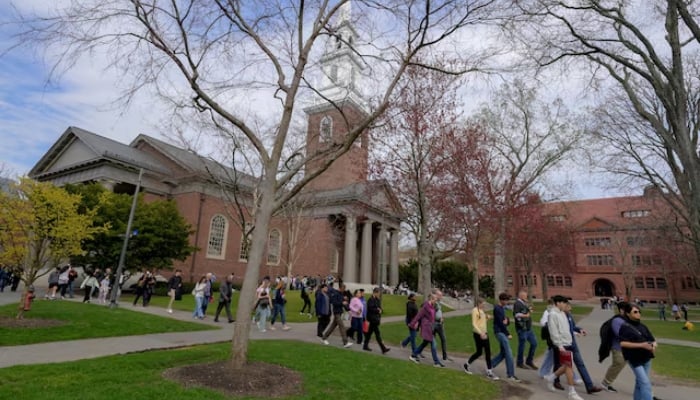Select Language:
- NYT reports that the April 11 demands may have been issued prematurely.
- Harvard claims the Trump administration is intensifying its demands.
- Numerous demands were rejected by Harvard; government froze certain funding.
WASHINGTON: On Saturday, Harvard University stated that the Trump administration is “intensifying” its extensive demands made of the institution, even after a report suggested that officials sent a letter outlining these demands without formal approval.
According to a report by the New York Times on Friday, the letter from government attorneys, which arrived at Harvard on April 11, was dispatched before it received the necessary clearance from high-level officials within President Donald Trump’s administration.
Just three days after this letter’s arrival, Harvard rejected various demands which it claimed would effectively surrender control over hiring, admissions, and educational instruction to the government.
Following this rejection, the Trump administration halted $2.3 billion in funding to Harvard, threatening to revoke its tax-exempt status and restrict its ability to enroll international students. They also requested extensive information regarding the university’s foreign affiliations, including details about students and faculty.
“Even if the administration now seeks to retract its list of astonishingly intrusive demands, it seems to have doubled down on those requests through recent actions,” a Harvard spokesperson commented. “Actions speak louder than words.”
Since taking office in January, Trump has targeted elite U.S. universities, claiming they mishandled the pro-Palestinian protests of the previous year and fostered antisemitism on campus. Detractors, including various Jewish organizations, argue that their critiques of Israeli policies are wrongly conflated with antisemitism.
Columbia University was an early target, but in recent weeks, Harvard has become the focus of the administration, which is attempting to oversee its student body, faculty, and curriculum in what appears to be an effort to address perceived liberal bias.
The New York Times reported that while the contents of the April 11 letter were confirmed as genuine, there were conflicting accounts within the Trump administration concerning its premature issuance.
Some White House officials believed the letter was sent too soon, while others thought it was intended for circulation among governmental staff first.
The White House has not offered an immediate response.
On April 3, the administration had already provided a list of demands that Harvard needed to fulfill to maintain federal funding. These earlier demands included prohibitions on mask-wearing, the elimination of diversity, equity, and inclusion initiatives, and an increase in cooperation with law enforcement.
The April 11 letter, signed by officials from the Education Department, Health Department, and General Services Administration, expanded on this list. It instructed Harvard to cease recognition of certain pro-Palestinian groups and urged the university to report foreign students who violate institution policies, among other items.
Harvard believed it could avoid confrontation with the Trump administration because both parties were in discussions. However, the letter led Harvard to conclude that a deal would not be attainable.
Harvard expressed no doubt regarding the authenticity of the letter and criticized its demands as “outrageous in their overreach.”






